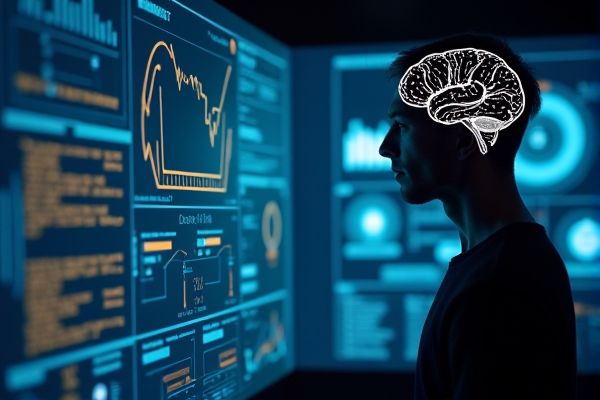
AI technologies enhance mental health services by providing instant access to resources and support through chatbots and mobile applications. These tools can analyze user data and offer personalized feedback, making it easier for individuals to manage their mental well-being. Predictive analytics can identify at-risk individuals, enabling timely interventions and improved outcomes. By streamlining administrative tasks, AI allows healthcare professionals to focus more on patient care, fostering a more efficient mental health environment.
AI usage in mental health services
Predictive Analytics
AI usage in mental health services can enhance predictive analytics capabilities, allowing for more accurate assessments of patient needs. By analyzing large datasets, such as treatment outcomes and demographic information, AI tools can identify trends that inform personalized care strategies. For example, institutions like the Mayo Clinic may leverage AI to forecast potential mental health crises among patients based on historical data. This approach offers the chance to improve intervention methods and ultimately enhance patient outcomes.
Personalized Therapy
AI usage in mental health services enhances personalized therapy by analyzing patient data to tailor treatment plans. For example, institutions like the Mayo Clinic are exploring AI-driven tools that adapt therapeutic approaches based on individual progress. This technology can identify patterns in behavior and emotional responses, improving session effectiveness. The integration of AI offers the potential for more responsive and adaptive mental health care solutions.
Chatbots and Virtual Assistants
AI technologies, such as chatbots and virtual assistants, offer the potential to enhance mental health services by providing immediate support to individuals in need. For example, tools like Woebot can engage users in conversation and deliver cognitive behavioral therapy techniques. This accessibility may reduce barriers to seeking help, especially for those who prefer anonymity. Incorporating AI in therapy could also streamline administrative tasks for mental health professionals, allowing them to focus more on patient care.
Emotion Recognition
AI usage in mental health services can enhance emotion recognition capabilities, allowing for better assessment of patient conditions. For instance, systems like Affectiva can analyze facial expressions to provide insights into emotional states. This technology might enable therapists at institutions like Stanford Medicine to tailor interventions more effectively based on real-time feedback. There is potential to improve patient outcomes by facilitating a more nuanced understanding of emotional dynamics.
Natural Language Processing
AI usage in mental health services can enhance patient interactions by employing Natural Language Processing (NLP) to analyze conversations for therapeutic insights. This technology may help identify patterns in patient behavior and sentiment, leading to more personalized treatment plans. For instance, chatbots powered by NLP can provide immediate support to individuals dealing with anxiety or depression. The chance of improving accessibility to mental health resources is significant, especially in underserved areas.
Remote Monitoring
AI applications in mental health services can enhance remote monitoring capabilities, allowing for real-time assessment of patient well-being. Technologies such as chatbots or mobile applications may facilitate ongoing communication between patients and healthcare providers. This could lead to timely interventions and improved treatment adherence. Institutions like the Mayo Clinic are exploring these innovative approaches to potentially increase access to mental health resources.
Confidentiality and Data Security
AI usage in mental health services enhances the ability to analyze patient data while maintaining confidentiality and data security. Tools like predictive analytics can identify patterns in behavior, potentially leading to better treatment options for conditions such as depression. Institutions like hospitals or therapy centers may implement AI systems that help manage sensitive information responsibly. This presents a chance for improved outcomes while ensuring patient trust in the therapeutic process.
Accessibility and Inclusivity
AI can enhance accessibility in mental health services by providing virtual therapy options, making support more readily available to diverse populations. For instance, platforms like Woebot utilize AI-driven chatbots to offer real-time mental health assistance, which can reach individuals in remote areas. This technology has the potential to lower barriers for those who may be hesitant to seek traditional therapy, thereby increasing overall engagement with mental health resources. In turn, fostering a more inclusive environment can lead to improved outcomes for various demographics, such as young adults facing anxiety.
Symptom Tracking
AI applications in mental health services can enhance symptom tracking through real-time data collection and analysis. For example, apps like Woebot help users monitor their feelings and provide personalized feedback based on their input. This technology holds the potential to improve patient outcomes by allowing for more tailored treatment plans. An increase in accurate symptom tracking can lead to better resource allocation by institutions like hospitals and clinics.
Crisis Intervention
AI can enhance mental health services by providing timely support in crisis intervention scenarios. For example, chatbots can evaluate an individual's emotional state and offer resources or coping strategies based on real-time data. This technology has the potential to bridge gaps in care, especially in underserved areas where access to professionals is limited. The integration of AI tools into institutions like mental health clinics may improve response times and outcomes for individuals in crisis.
 techknowy.com
techknowy.com